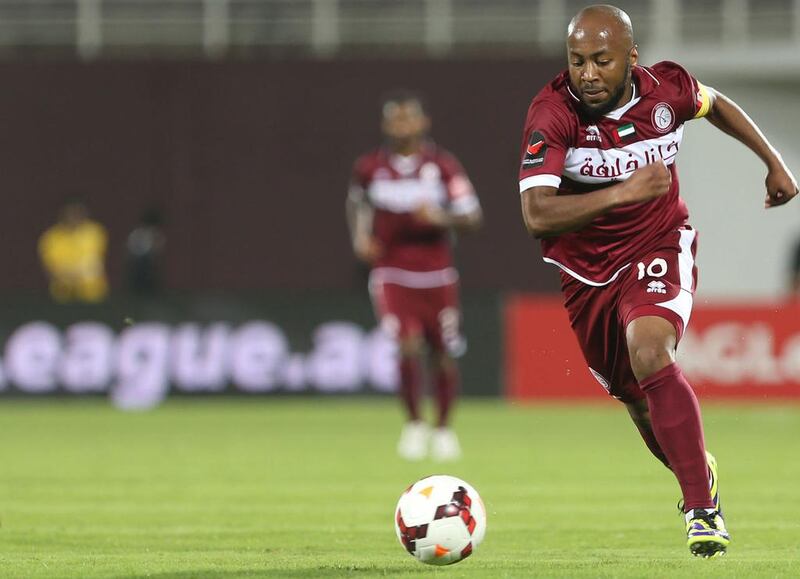It was not always Omar Abdulrahman. Casual observers of Emirati football would be forgiven for thinking there was ever a time when the Al Ain midfield maestro was not the country’s darling.
But then they would not know Ismail Matar, the country’s original golden boy.
On Tuesday, Matar proved once again that, despite increasingly less time in the spotlight, he can still deliver when called upon.
The 30-year-old striker may not be the first name on the team-sheet for his beloved Al Wahda these days, but against Baniyas in the Arabian Gulf League on Tuesday, he produced a performance that recalled his heyday, setting up goals for Damian Diaz and Sebastian Tagliabue in a deserved 3-2 win. It was reminder that there is life in those legs yet.
The striker became the nation’s great big hope when he won the Golden Ball for best player at the 2003 Youth World Cup here in the UAE.
Four years later he cemented his status as the country’s golden boy when he led the national team to their first ever Gulf Cup of Nations triumph, scoring five goals including the winners in the semi-final against Saudi Arabia and the final against Oman.
Emirati fans remain grateful for his contributions during a spell when Emirati football toiled.
As for his fellow players, you only have to watch a UAE match these days to see the reverence that the nation’s younger generation have for a man they still consider their leader.
Matar remains UAE squad captain and an important influence on Mahdi Ali’s young team.
In just over 11 months, the 2015 Asian Cup will kick off in Melbourne, and for once, the UAE will travel in expectation rather than forlorn hope.
If Matar’s career is to enjoy a late swansong on the international scene, then he could not have chosen a better time kick-start it.
By the time of the big kick off he will be 31, and likely experiencing his last major international tournament.
For Mahdi Ali, his mere presence will have an effect on the squad, as shown during last year’s victorious Gulf Cup campaign in Bahrain.
Matar only started once, the 2-0 win over Oman in the last group match, and even then he was replaced by Ahmed Khalil after 60 minutes, in what appeared to be a pre-planned substitution.
The idea was that Matar would give his all in that hour and then allow the younger Al Ahli forward to run at a tiring Omani defence.
The plan worked like a charm with Khalil scoring both goals in the final minutes of the match.
He stayed on the bench for the entirety of the semi-final against Kuwait, but replaced Ali Mabkhout after an hour of the final against Iraq, and played his part in the 2-1 triumph in extra time.
At the final whistle, it was Matar, not Abdulrahman or match-winner Ismail Al Hammadi, that was carried on the shoulders of his teammates.
The captain wept uncontrollably, before composing himself to receive the big trophy.
As a hero of both the 2007 and 2013 triumphs, his place in Emirati football folklore was cemented.
But there was more to come. The UAE’s Asian Cup qualifier against Uzbekistan at Mohammed bin Zayed Stadium in March was billed as a big test for Mahdi Ali’s team after Abdulrahman was ruled out through injury. Trailing by a goal at half-time, the coach introduced Matar for the second half and he rolled back the years with a superb performance reminiscent of his form in 2003, inspiring his country to a 2-1 win.
The scenes of celebration at the end echoed those in Bahrain, with Matar being hurled into the Abu Dhabi air by teammates.
As they did when qualification was finally confirmed against Hong Kong in November. More than mere appreciation for the team’s elder statesman, you get the feeling the rest of the squad see Matar as the team’s talisman. Matar himself will want to be more than just a lucky charm.
No Emirati will forget his contributions to the two Gulf Cup triumphs and the three league titles over the past 10 years with his club, and the 34 goals in 112 matches for his country.
Still, this is the man that was once tipped to become the first Emirati to make a big move abroad, and in that sense, there lingers a sense of a missed opportunity about his career.
None of that will matter to him if he leads the UAE to glory next year though.
For Matar, Australia 2015 will represent a final chance to make a mark on the international scene beyond these shores.
The rest of us should cherish him while we can.
akhaled@thenational.ae
Follow us on Twitter @SprtNationalUAE





